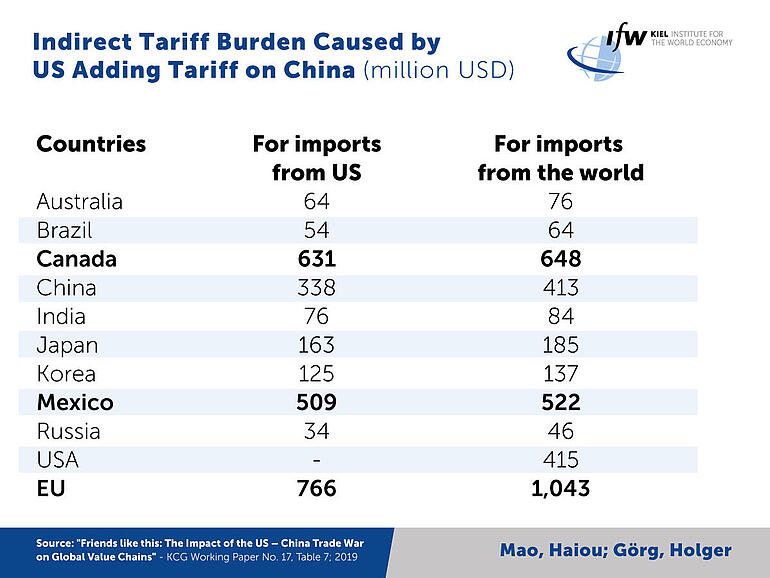News
How the US-China customs war hurts others

"Our figures show that third countries have an economic incentive to help solving the difficulties causing the dispute. They also provide further proof that China has more to lose than the US, as it is much more integrated as a supplier in global supply chains," says Kiel Institute researcher Holger Görg, head of the Kiel Centre for Globalization and co-author of the study "Friends like this: The Impact of the US-China Trade War on Global Value Chains". According to the results of the study, Mexico and Canada will each have to bear additional burdens amounting to a good 500 and 650 million US dollars, respectively, due to US tariffs imposed on Chinese products. The EU as a whole has been hit even harder: around one billion US dollars in additional burden will be imposed.
Indirect effects of the trade war arise primarily because products subject to import tariffs are processed in the US or China as intermediate products and then exported again to third countries, where the tariffs are reflected in more expensive products. Therefore, these countries also suffer a loss of prosperity as a result of the trade war between the US and China. These tariffs can also accumulate over several steps in a supply chain. For the first time, the study attempts to measure these tariff effects transmitted via supply chains using trade and input/output data.
The data show that US tariffs on Chinese products in particular have an impact on third countries. This is because they more frequently affect intermediate products, while US exports to China are less frequently traded again. This is why Mexico, for example, is severely affected, as it further processes intermediate products subject to US tariffs before exporting the end products to the US. In particular, the chemical industry, the electrical industry, and vehicle production of the most important US trading partners Mexico and Canada are strongly affected by the higher tariffs, as these industries depend on imported intermediate products from China, among others.

China's tariffs on US products have a comparatively smaller impact via indirect tariffs. The US itself (325 million US dollars) and the EU (126 million US dollars) are the hardest hit with respect to global imports. Other countries have indirect tariff effects of less than 100 million US dollars.
Kiel Institute expert Holger Görg: "The study shows that third countries cannot afford to stand back in the trade war and only watch it from the sidelines. Due to the strong integration in global supply chains, they themselves are also affected and have to accept considerable additional costs that affect both companies and consumers. So there is a strong economic policy incentive for third countries to act as intermediaries and work towards an agreement between the US and China."
